Getting a certification in Kubernetes is one of the best ways by which you can upgrade yourself in the hierarchy of security professionals. Many of the best Kubernetes courses can nurture the needed Kubernetes skills and competency in professionals, enabling them to be capable enough to manage and protect cloud-native technologies like Kubernetes. This blog comprehensively discusses the best Kubernetes certification in 2024.
“Give a man a container and you keep him busy for a day; Teach a man Kubernetes, and you keep him busy for a lifetime.”
-Kelsey Hightower
Top 5 Best Kubernetes Certification and Courses – 2024
Are you trying to find the best Kubernetes certification courses for 2024? Well, which Kubernetes courses would suit you depends on what role you’re looking for and which skills you aspire to upskill. Here is a detailed comparison and the list of the 5 best Kubernetes certification for 2024.
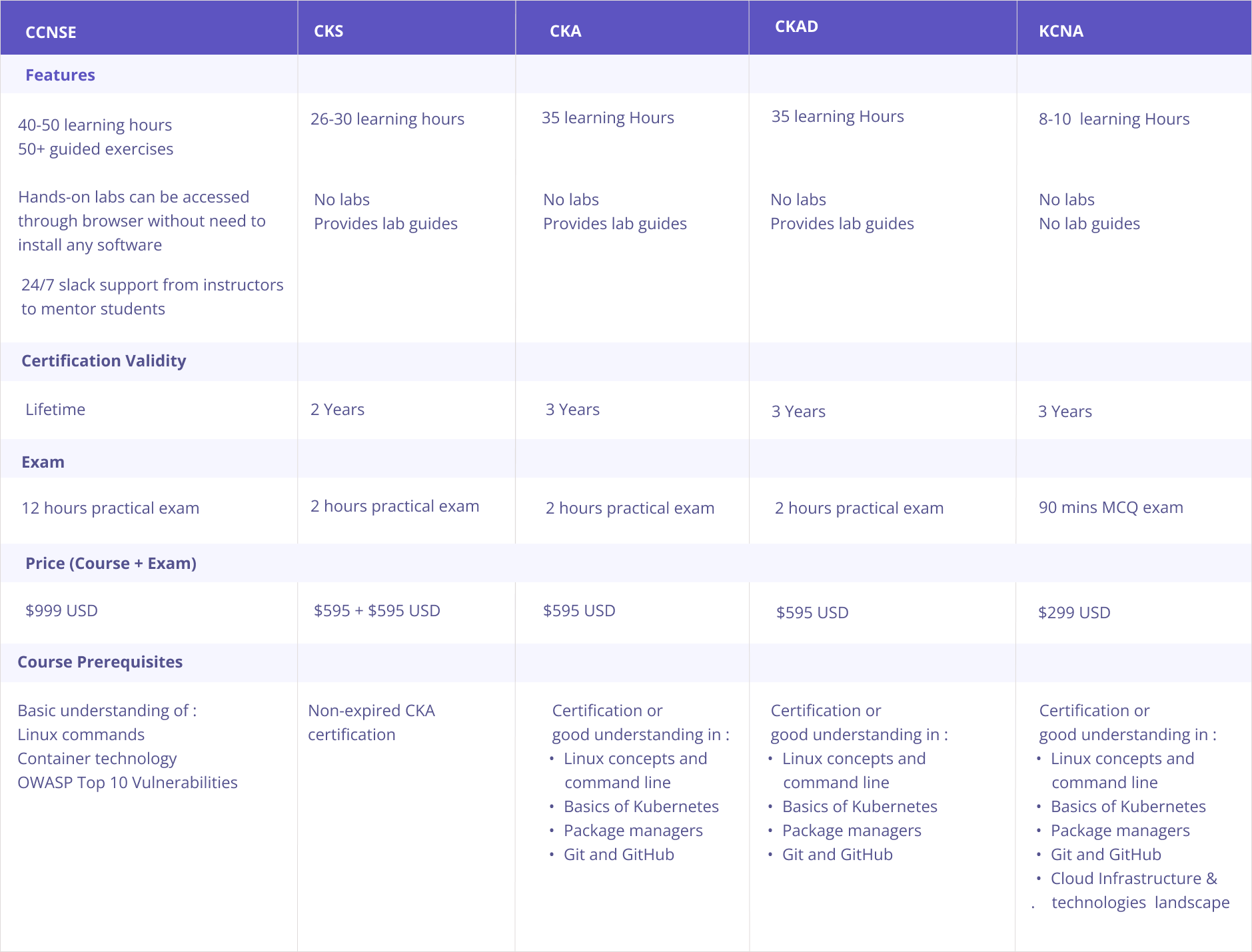
Certified Cloud-Native Security Expert (CCNSE)
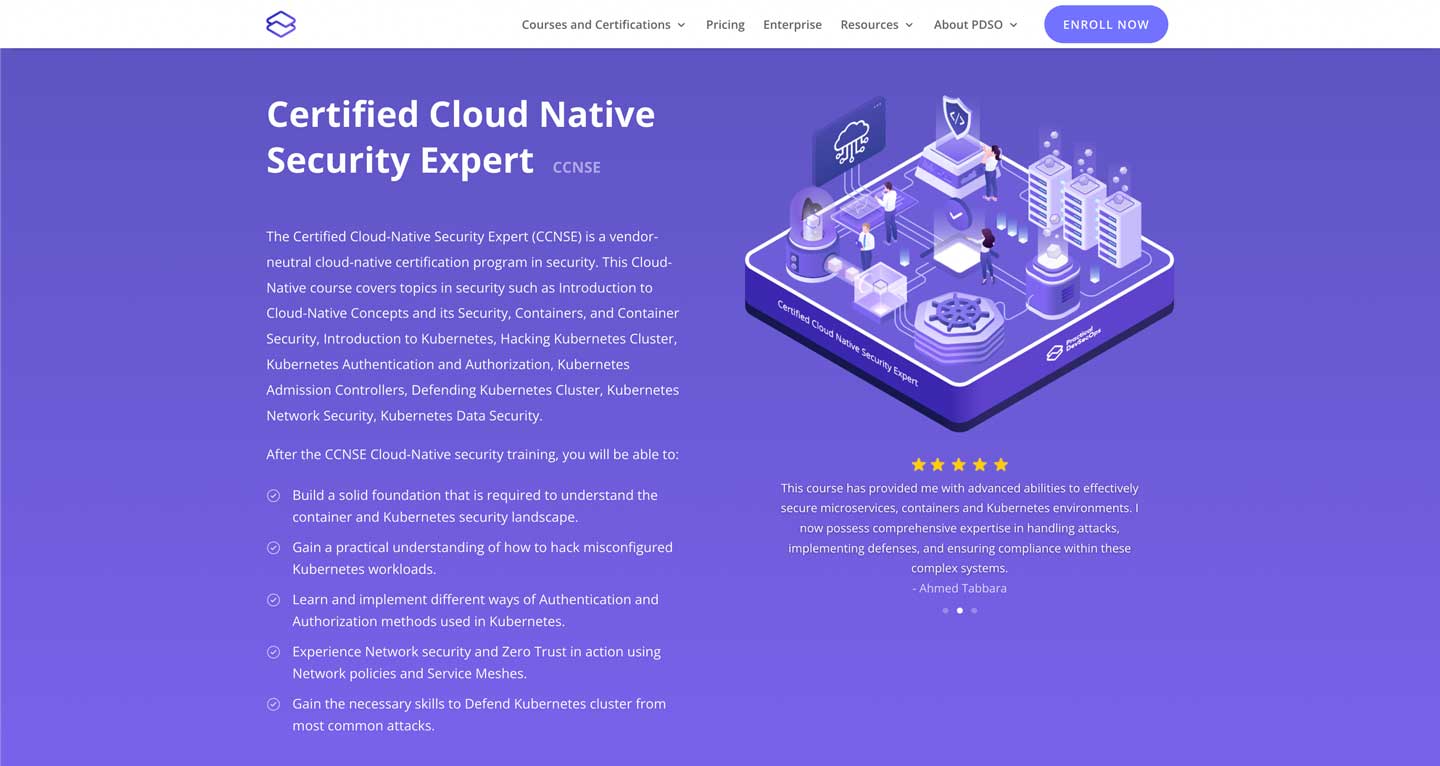
The Certified Cloud-Native Security Expert (CCNSE) course is one of the best Kubernetes certification for upskilling in Kubernetes security offered by Practical DevSecOps.
In addition to theory, the course offers hands-on Kubernetes training through browser-based labs.
The CCNSE course provides ample resources for students to excel in its 12-hour practical exam, such as 50+ guided exercises, 24/7 instructor support, and more.
Best suited for Security Professionals, Penetration Testers, Red Teamers, Application Security Engineers, IT managers, Developers, and DevOps Engineers.
Duration: Flexible
Validity: Lifetime
Kubernetes certification cost: 999 USD
The following topics are covered in depth in the CCNSE course:
- Cloud-Native Concepts and its Security
- Microservices Architecture
- Containers and Container Security
- Introduction to Kubernetes
- Hacking Kubernetes Cluster
- Kubernetes Authentication and Authorization
- Kubernetes Data Security
- Kubernetes Network Security
- Defending Kubernetes Cluster
Certified Kubernetes Security Specialists (CKS)
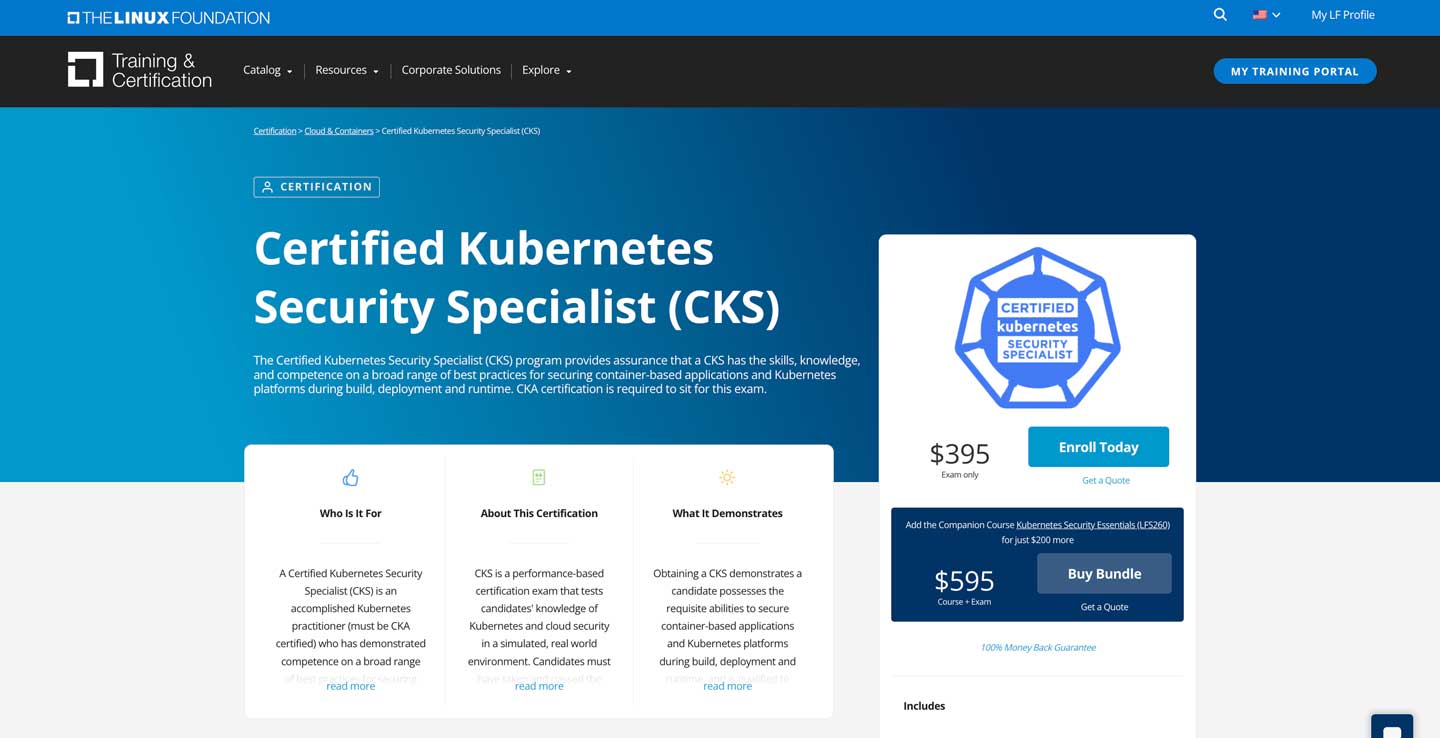
The Certified Kubernetes Security Specialists certification is one of the best Kubernetes courses if you’re trying to understand the fundamentals of Kubernetes security and prefer a short syllabus.
However, before registering for the CKS exam, candidates must have a non-expired CKA certification.
To get certified, the candidates must take a 2-hour practical exam. The exam retake is allowed twice per exam registration.
Also, Read How to Pass CKS Exam
No labs are provided, and candidates must set up their labs using a Linux server or desktop/laptop and a public cloud provider or VirtualBox.
Best Suited for DevOps Engineers, Software Engineers, and Site Reliability Engineers.
Validity: 2 Years
Certification prerequisite: Non-expired CKA certification
Kubernetes certification cost: 595 USD + an additional 595 USD for CKA
The following topics are covered in the CKS course:
- Cluster Setup
- Cluster Hardening
- System Hardening
- Minimize Microservice Vulnerabilities
- Supply Chain Security
- Monitoring, Logging, and Runtime Security
Also read, Is CKS Certification Worth it?
Also Read, CKS vs. CKA, Understand the Difference
Certified Kubernetes Administrator (CKA)
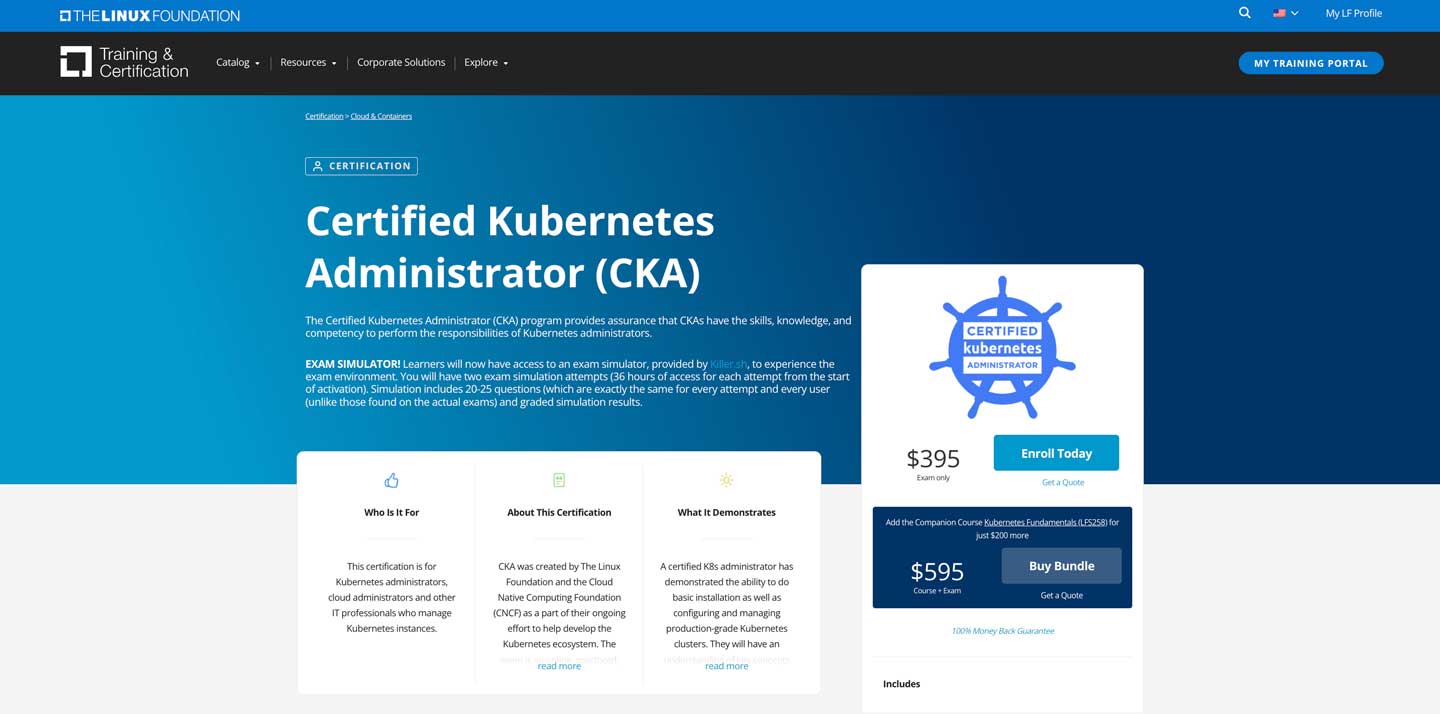
The Kubernetes Administrator certification primarily aims to demonstrate a candidate’s abilities to perform the duties of Kubernetes administrators.
But no labs are provided in their training, and students have to set them up independently based on the lab guide provided.
Linux Foundation offers the Kubernetes Fundamentals LFS258 course to provide its candidates with the required understanding to pass the CKA exams.
Best Suited for Kubernetes Administrators, Cloud Administrators, and other IT Professionals.
Validity: 3 Years
Kubernetes certification cost: 595 USD
The following topics are covered in the CKA course:
- Storage
- Troubleshooting
- Workloads & Scheduling
- Cluster Architecture, Installation & Configuration
- Services & Networking
Also read, CKS vs. CKA, Understand the difference
Certified Kubernetes Application Developer (CKAD)
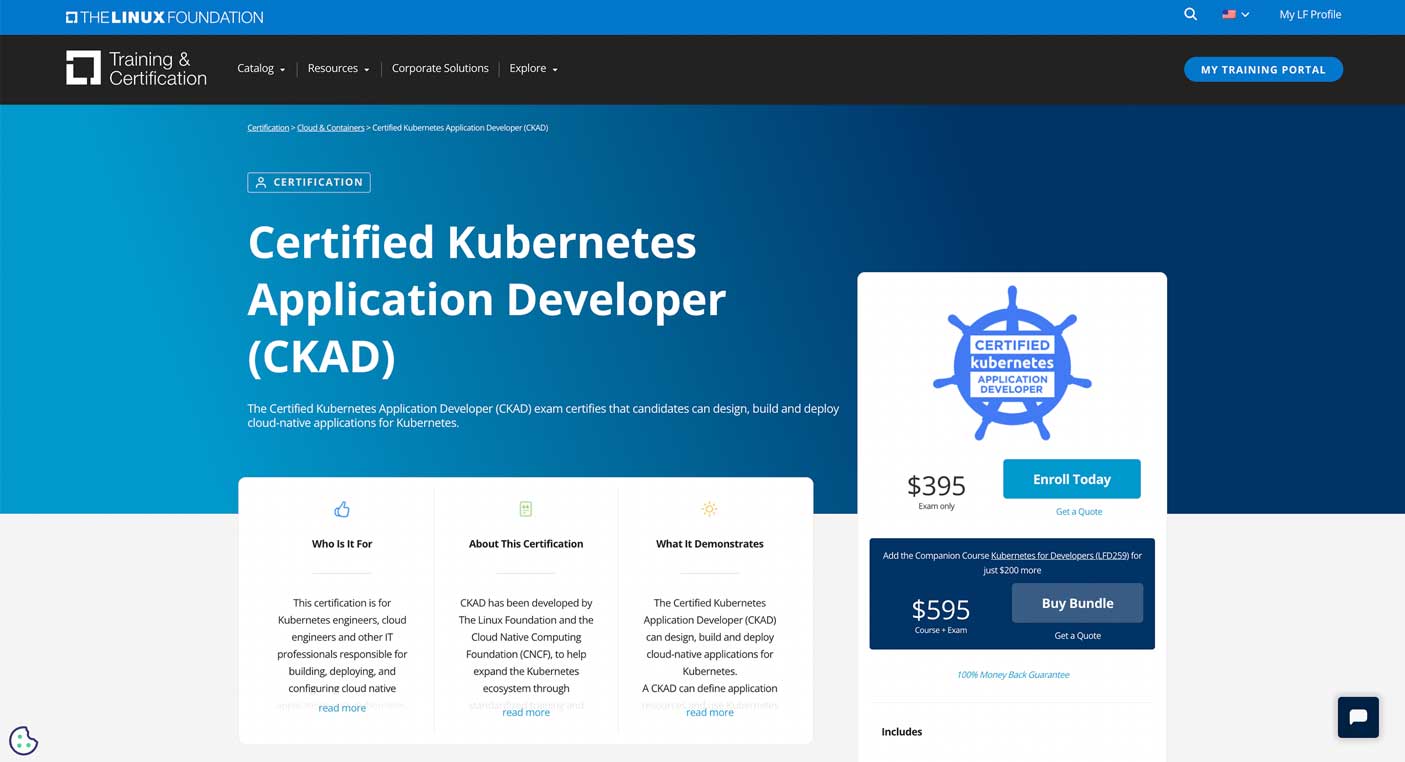
Certified Kubernetes Application Developer is for those who want to engage in cloud-native microservice application development and deployment.
CKAD evaluates candidates’ abilities to design, develop, and deploy cloud-native applications for Kubernetes.
Kubernetes for Developers LFD259 is the training course Linux Foundation provides for developers interested in Kubernetes.
This course requires students to be familiar with Kubernetes, Linux concepts and command line, package managers, Git, and Github. However, the course does not provide a lab environment, meaning students must establish their own lab setups to practice.
Best Suited for Administrators, Developers, and Engineers who want to engage in Kubernetes application development.
Validity: 3 Years
Kubernetes certification cost: 595 USD
The following topics are covered in the CKAD course:
- Application Design and Build
- Application Deployment
- Application Observability and Maintenance
- Application Environment, Configuration, and Security
- Services and Networking
Also read, CKAD vs CKA
Kubernetes and Cloud Native Associate (KCNA)
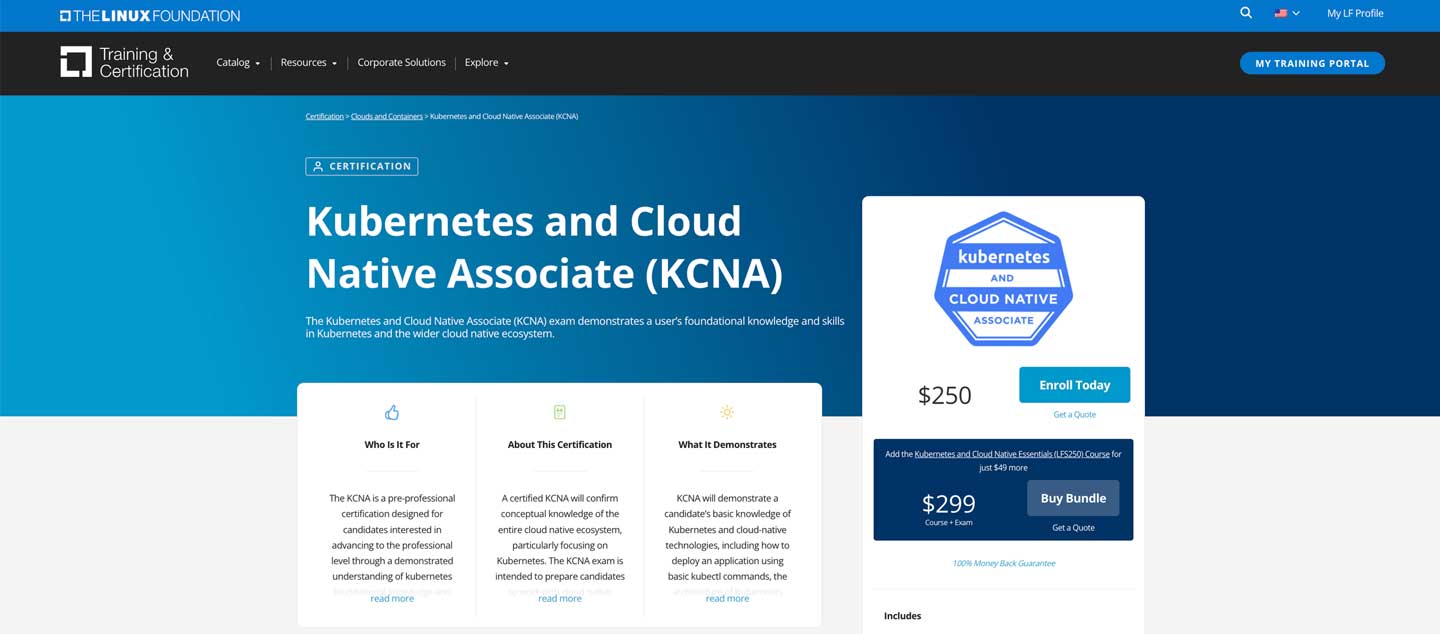
Kubernetes and Cloud Native Associate certification by Linux Foundation is designed for candidates who want to have foundational knowledge and skills in understanding Kubernetes.
This is not a professional-level certificate and therefore requires no prerequisites.
KCNA has a relatively easy exam focusing on Kubernetes and related tools in a cloud-native environment. KCNA certification has no practical exam but tests its candidates’ know-how through 60 multiple-choice questions.
Best Suited for anyone interested in gaining a basic understanding of Kubernetes.
Validity: 3 Years
Kubernetes certification cost: 299 USD
Also read Best Kubernetes Books
KCNA gives a theoretical understanding of the following topics:
- Kubernetes Architecture and Components
- Kubernetes Networking
- Kubernetes Storage
- Kubernetes Security
- Kubernetes Monitoring and Logging
- Cloud-Native Application Development
- Container Orchestration with Kubernetes
More interested in best Kubernetes courses relating to security?
Conclusion
The best Kubernetes courses can elevate your standing within the cloud industry and enhance your professional prospects. CCNSE, CKS, CKA, CKAD, and KCNA are some of the best Kubernetes certifications available to level up your understanding of Kubernetes. However, you must be careful in choosing between Kubernetes certifications as the scope and opportunity each can provide may differ in their merits. I hope this blog has helped you to make the right decision in your upskilling.
Most Frequently Asked Questions
What are the prerequisites for a Kubernetes certification?
Prerequisites vary; typically, basic knowledge of Linux, Docker, and Kubernetes fundamentals is needed. Some certifications, like CKS, require a valid CKA certification first.
How does Kubernetes certification benefit my career?
Kubernetes certification enhances your skills, proving your expertise in managing containerized applications, boosting your employability and opening doors to higher-paying roles in IT and DevOps.
What is the average salary for Kubernetes professionals?
The average salary for Kubernetes professionals ranges from $120,000 to $150,000 per year, depending on experience and location.
How can I prepare for a Kubernetes certification exam?
Prepare by studying the official documentation, enrolling in online courses, practicing hands-on labs, and using resources like Kubernetes the Hard Way.
Which industries benefit most from Kubernetes practices?
Industries such as finance, healthcare, e-commerce, and technology benefit greatly from Kubernetes practices due to their need for scalable and efficient container orchestration.
What kind of hands-on experience can I expect from these courses?
Courses offer hands-on labs, real-world scenarios, and practical exercises that help you apply Kubernetes concepts in managing clusters, deploying applications, and securing environments.
Are there any free resources for learning Kubernetes?
Yes, free resources include Kubernetes documentation, tutorials on platforms like YouTube, and free courses from providers like Coursera and edX.
How does the Kubernetes certification process work?
The certification process typically involves studying the required material, registering for the exam, and passing a practical test that evaluates your skills in managing Kubernetes environments.
What are the key features of a good Kubernetes certification course?
A good Kubernetes certification course includes comprehensive coverage of topics, hands-on labs, real-world scenarios, expert instructor support, and preparation for the certification exam.
Can I get a job without a Kubernetes certification?
Yes, you can get a job without a Kubernetes certification, but having one significantly boosts your chances by proving your expertise and commitment to potential employers.
Interested in DevSecOps ? Here is the List of Top DevSecOps Certification Courses
Also Read, Best Containerization Certifications in 2023


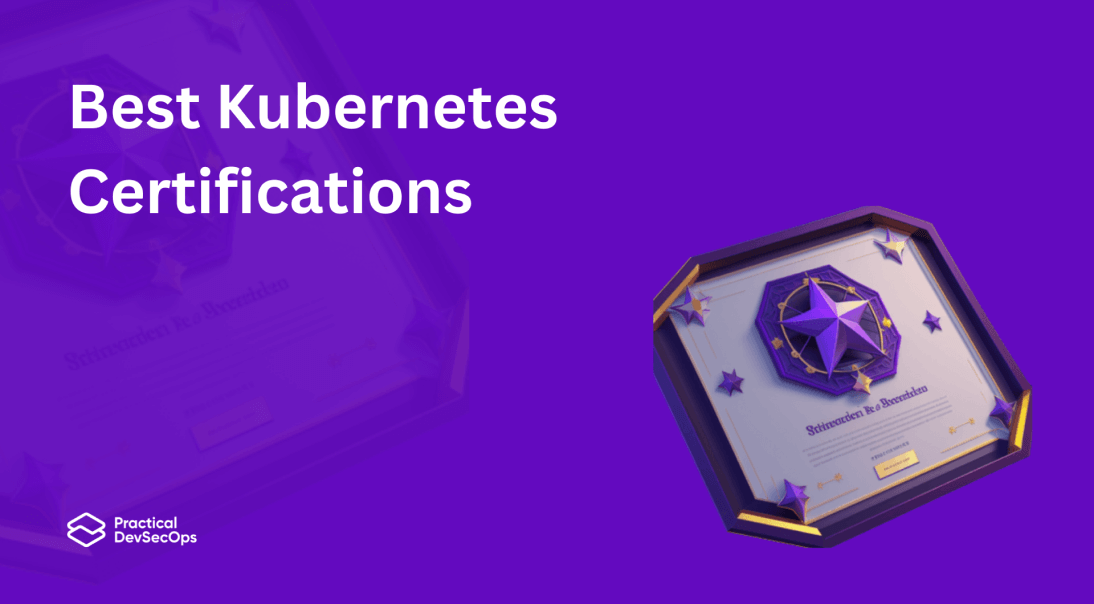




0 Comments